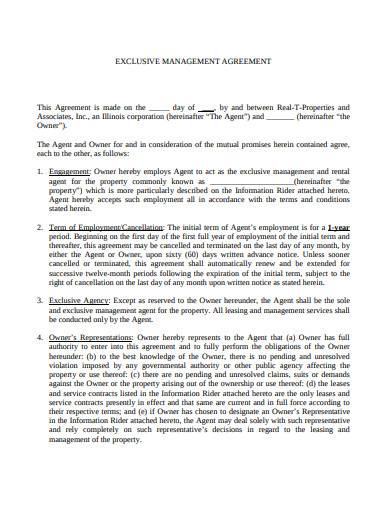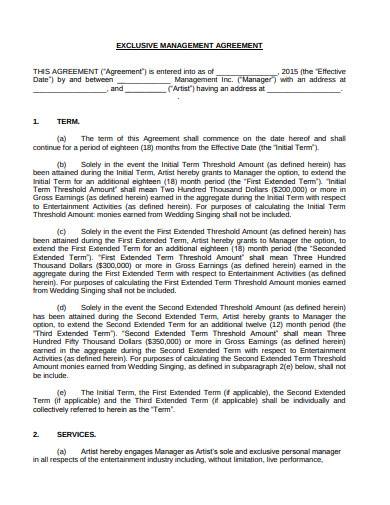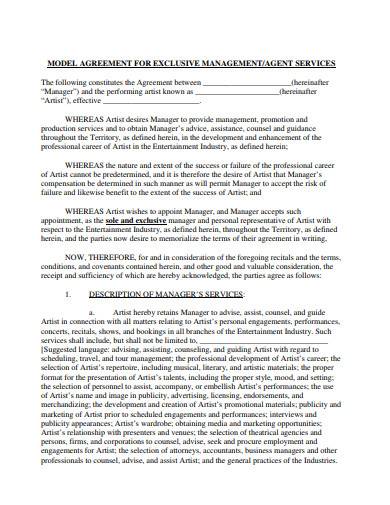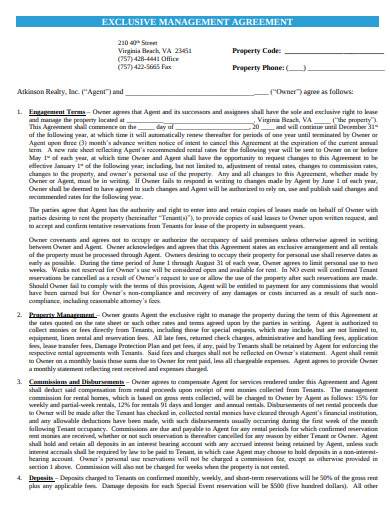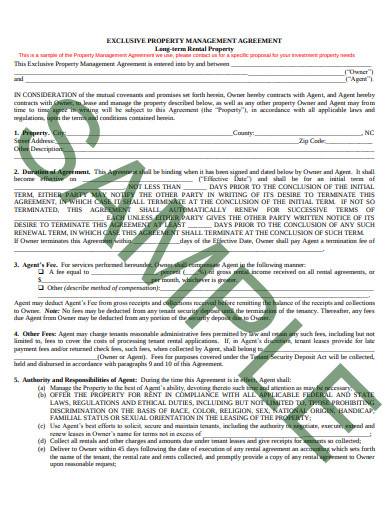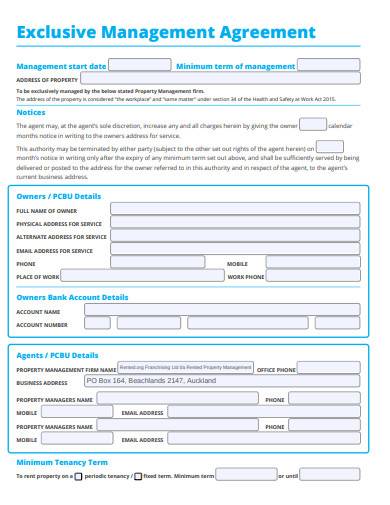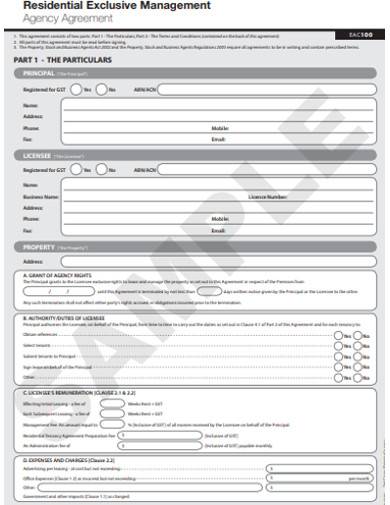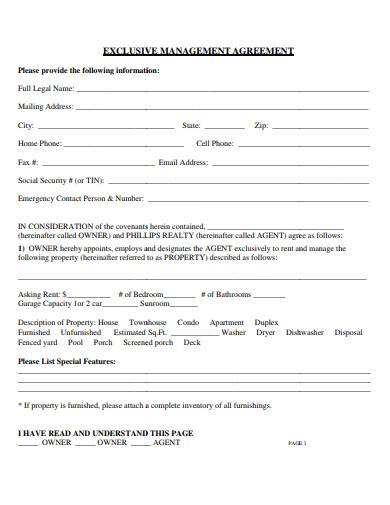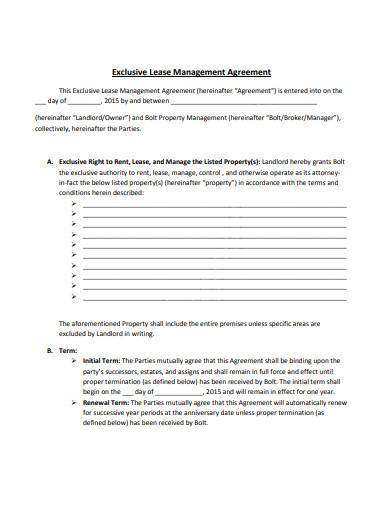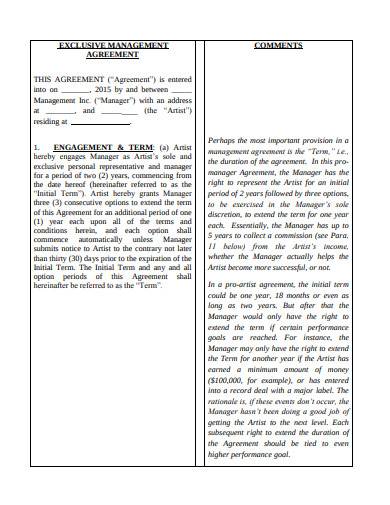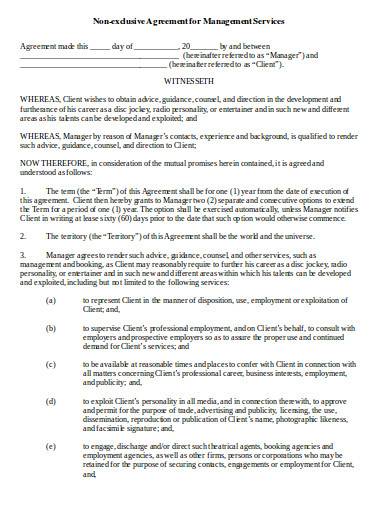Not all products are as suitable as fast-moving consumer goods (FMCG) for a massive distribution channel. Depending on the result of your initial analysis, you have to use another distribution channel to distribute your products effectively. The same goes for the artists’ management, commercial property management, rental management, real estate management, and the like. You may have to use a different approach to increase your company’s revenues. In some instances, you may need to get into the exclusive management agreement.
What is an Exclusive Management Agreement?
An exclusive management agreement is a type of business agreement that you can use if you intend for an exclusive right to manage an asset or a property. In general, businesses and individuals use this type of contract to maximize the benefits both parties can have.
Contents of an Exclusive Management Agreement
In a broader sense, exclusive management agreement is a way to set expectations for the client and the service provider about the exclusivity clauses that both parties agreed. This may include various provisions, such as the responsibilities of both parties, legal liabilities, and insurance coverage.
Advantages of Getting into Exclusive Management
Binding yourself into an exclusive management agreement with clients may come with disadvantages. However, there are also several benefits which may outweigh the issues or problems an exclusive management contract can provide, such as:
1. Strong Relationship
By getting into an exclusive property management agreement, you can avoid unnecessary conflicts or misunderstanding. It is because your client will have to consult you on all the actions on the relevant management services that you have agreed to. As long as you handle it properly, you can ensure that you can build a healthy relationship.
2. Better Management
Since you are the exclusive manager of the client’s property, you have full control of the relevant services. This means that you don’t have to worry about other third party organizations making specific actions that may conflict with the management service you are performing.
3. Higher Revenues
Whether your firm manages artists or real estate properties, you can easily manage them in a way that will allow them to generate more revenues with an exclusive management agreement at your disposal. These gains will also reflect on your company’s earning.
10+ Exclusive Management Agreement Samples in PDF | DOC
Are you looking for an exclusive management agreement examples you can make use of for your business? If that is the case, you are in the right place. Below are the agreement examples you can use for whichever purpose it may serve you. You can download these documents in PDF and MS Word formats.
1. Exclusive Management Agreement Sample
2. Exclusive Management Agreement Template
3. Model Agreement for Exclusive Management Agreement
4. Standard Exclusive Management Agreement Template
5. Exclusive Property Management Agreement Template
6. Printable Exclusive Management Agreement Sample
7. Residential Exclusive Management Agreement Template
8. Exclusive Management Agreement in PDF
9. Exclusive Lease Management Agreement Sample
10. Exclusive Management Agreement Example in PDF
11. Non-Exclusive Agreement for Management Services in DOC
How to Manage an Exclusive Management Agreement
In creating exclusive agency agreements, rental management agreements, distribution agreements, sales agreements, or property management agreements, it would greatly help if you have a guide which you can follow. Thus, we wrote the best practices in enforcing an exclusive management agreement.
1. Prepare
An exclusive management agreement is a legal document. Therefore, you have to cover all the necessary provisions to ensure that it won’t work against your favor. To do it, you have to determine the reason why you need a contract before anything else. Write down your goals and make sure to prepare the expectations and risks involved if you will pursue this deal.
2. Create a Draft
In this stage, you will organize the information you have gathered from the previous step. Then, you need to consult with an attorney with a specialization in the industry you are operating to double-check your draft. By doing so, you can ensure that all clauses in the contract are complying with the law. Additionally, you can also hire an editor to correct any writing errors. You may also check our article about professional writing for tips in creating a legally binding and professional contract.
3. Meet with the Client
Once you finished the draft, meet with the client to discuss the contents of the agreement. At this point, the client may choose to make changes with some clauses in the contract. We recommend that you will listen to what the client wants to happen. By doing it, you can gain their trust and create a strong relationship with them. It will also help if you are transparent about the essential things that you didn’t include in the contract but are significant enough in the relationship you are going to build.
4. Get the Approval
Once you are done making negotiations, you will then approach your superior to get an approval. Many businesses use this process to ensure that all the approved documents follow the requirements and company policy. It will also help if you consult with an attorney and the editor to check the final draft before the approval.
5. Make it Official
Let’s say that both you and the client have already agreed with the final draft. Therefore, the contract is ready for execution. To close the deal, you have to affix your signature in the document. Aside from that, it is also vital for the client to sign the agreement for it to take full effect. Other agreements may require you to let other affecting entities sign the contract.
6. Monitor Changes
The execution of the contract is not the end of the business process. Throughout its implementation, changes and revisions may occur, especially with the presence of unaccounted factors. As it happens, you have to inform the client and ask for his approval. To ensure that you can take into account all these changes, it will help if you use a changelog.
The U.S. Bureau of Labor Statistics projected a 7% management employment growth for 2018 to 2028. With that said, you have a high chance of getting hired if you are planning to get a job in the management industry. With the information provided in this article, you now have an idea about a thing this sector.
Related Posts
FREE 10+ Sample Extension Agreement Templates in PDF | MS Word
FREE 10+ Sample Pledge Agreement Templates in PDF | MS Word
FREE 10+ Sample Master Agreement Templates in PDF | MS Word
FREE 8+ Non-Exclusive Agreement Templates in PDF | MS Word
FREE 8+ Amalgamation Agreement Samples in PDF
FREE 9+ Sample Note Agreement Templates in PDF | MS Word
FREE 8+ Independent Agreement Templates in PDF | MS Word
FREE 6+ Goods Agreement Samples in PDF
FREE 10+ Retail Vendor Agreement Samples in PDF | DOC
FREE 11+ Retail Lease Agreement Samples in PDF | MS Word
FREE 9+ Sample Website Terms and Conditions in PDF
FREE 9+ Sample Online Non-Disclosure Agreement Templates in PDF | MS Word
FREE 9+ Guarantee Agreement Samples in PDF
FREE 10+ Co-Management Agreement Samples in PDF | DOC
FREE 18+ Custody Agreement Samples in MS Word | Pages | Google Docs | PDF

